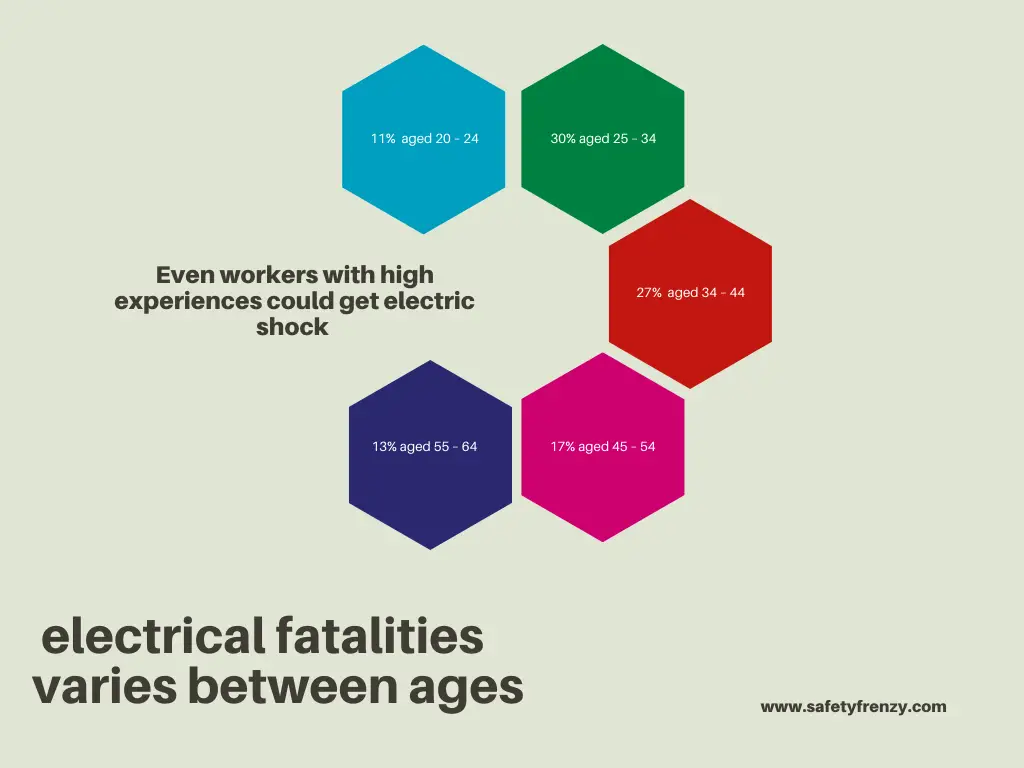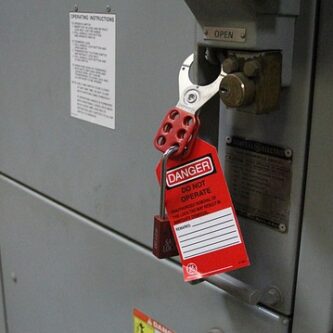Electrical personal protective equipment (PPE) is equipment to reduce exposure to workplace electrical hazards that can cause serious injuries, burns, electric shock or fatal incidents.
Electrical hazards are almost at all workplaces, starting with small workshop to large industrial workplaces.
Do electricians wear PPE?
Electricians do use PPE. Electrical PPE items are necessary for all workers and all persons at the workplace when involved in an electrical task.
Depending on the hazards, the PPE set for electricians is determined. As I will explain to you with example later in this article.
The difference between one person and another is what kind of risks he faces during the job.
For example, A worker who work in electrical power plant near large noisy generators needs PPE which contains hearing protection.
While the same person during a medium voltage switch gear maintenance, should wear a full arc protection suit.
So a complete deep risk assessment should help in what is PPE for electrical worker safety for a particular job.
Why is electrical PPE important?
Disconnecting electrical power is required as it possible. Never rely only on PPE. PPE should be the last resort and final defense line against electrical hazard at workplace.
The first important defense is your attention and safety culture. As you know, many electrical tasks require the electricians to work on live parts.
Always keep alert and pay attention for the hazards around you, even if you are doing a routine job which you repeated it hundreds and may be thousands of times.
Wearing PPE during electrical work protects you against electrical hazards, which can happen accidentally, and can cause you injuries and burns.
Unfortunately, even if all precautions are taken, electrical arc flash accidents still have a chance to happen.
Case study
My coworkers were working on an OHTL 11 KV network, They isolated power but didn’t wear isolated gloves.
While they were working they took an electric shock. Fortunately, the power was not connected, It was just a pulse of the 11KV only due to a fault in the network.
Protective equipment is not for new workers only. It also for those worker of high experience. The below graph shows that all workers at all ages are a possible victims of electricity.

From the graph its clear that electrical fatalities happens to workers from all ages which means from all experience levels.
Some workers rely on the experience, and that they did this electrical job many times without wearing protective items.
But the truth is, the hazards need just one simple mistake to kill you hard.
What PPE does an electrician need?
The required electrical PPE for electricians are based on the job task to be performed and existing hazards.
NFPA 70E is a good reference for safe work practice for electrical workers by reducing exposure to electrical hazards at workplaces.
Take a walk through in the job site and take notes about all possible risks.
Then, determine the minimum required electrical protective equipment and then exceed this minimum requirement for more safety.
Hereunder some common electrical hazards and proper protective items.
| Electrical Hazard | PPE |
| Electric shock | · Isolated gloves.
· Safety shoes. |
| Arc flash | · Safety glasses.
· Arc flash suit (See NFPA 70E 130.7(C)) |
| Loud workplace | Earplugs, or buffs |
| Working at height | Safety harness and belts |
| Confined space work | · Breathing apparatus
· Breathing air cylinder |
In the above table some hazards that are not related to electrical work directly, but the job may has one or more of these hazards besides the electrical danger of the job.
So its important to identify all the possible electrical and non electrical hazards to determine what precautions and protective equipment to use.
For more information about Electrical Hazard and Safety, Read my Article here.
What PPE can prevent electrocution?
Electrical PPE required to reduce the exposure to electrical hazard depends on the job and varies from one task to another.
Hereunder the common PPE to protect against electrical shock:
- Isolated gloves, These gloves should be suitable for the voltage level.
- Hard hats, Protects against direct contact to electricity with your head.
- Isolated safety boots, prevents connecting your body with the ground. However, you shouldn’t touch any grounded parts with your hands.
PPE for electrical work Example
If the job is to make electrical maintenance for lighting high mast pole, the possible hazards and its protective equipment are as follows:
- Electrical shock.
- Slips, trips and falling from the high mast pole.
- Head injury.
- Hands injury.
- Eye injury.
personal protective items which are necessary for this job are:
- Hard hat for head protection.
- Isolated gloves.
- Safety glasses.
- Anti slip safety shoes to prevent slipping while working on the high mast metallic body.
- Safety harness and belt. The belt should be attached to a fixed point above head level.
If the electrician will work on a trouble shoot in a power generation plant, the hazards and the required PPE:
Hazards:
- Electrical shock
- Slips, trips and falling
- Head injury
- Hands injury
- Eye injury
- Noise
PPE for this task:
- Hard hat for head protection
- Isolated gloves
- Safety glasses
- Anti slip safety shoes
- Ear muffs to protect against noise.
Why is PPE important for electronics works?
While electronics work may has only low voltage DC devices, but almost all these low voltage devices has an AC power source (110 or 220V).
Workers who repair electronics devices should also wear suitable PPE to protect them against electrocution. Like isolated gloves, isolated safety boots and a helmet. They also should wear safety glasses.
In my workplace, my friends work on electronics devices on site. Many of Their jobs require PPE more just like all other workers on the site, like safety harness in case of working at heights, ear muffs, Breathing apparatus when working in confined space.
Once again, workers in the electronics field should wear PPE depending on the job hazard. A good safety risk assessment before each job will help you what PPE they need.
Building a culture about electrical PPE
All workers should take a regular training about what items to wear and when they should wear these items.
Also the proper way of using and wearing these protective items.
All workers should know that “even if the protective items are not comfort you should keep wearing them”.
Also teach them that no exceptions are allowed even for sort time jobs, never skip safety rules.
No matter what kind of PPE is available in the workplace, the important thing that matters most is the safety culture of all employers.
This safety culture will be strong and effective by getting workers engaged in safety programs. And by announcing that safety is the priority number one.
All employers should have the authority to stop any unsafe work and report it to the supervisor immediately to evaluate and control the hazard.


